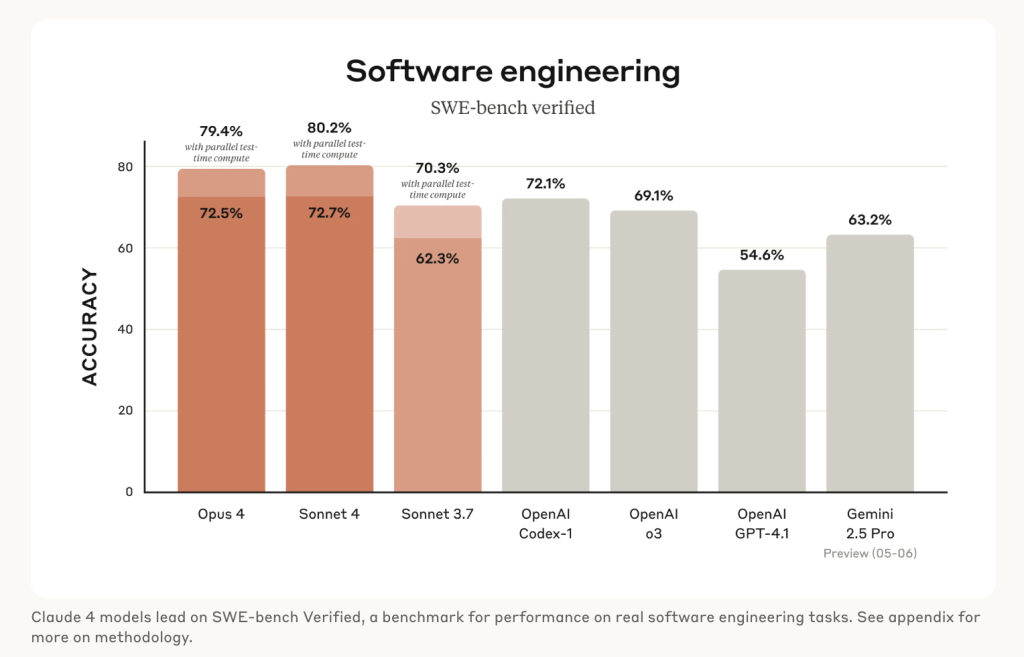Anthropic has announced the release of its next-generation language models: Claude Opus 4 and Claude Sonnet 4. The update marks a significant technical refinement in the Claude model family, particularly in areas involving structured reasoning, software engineering, and autonomous agent behaviors.
This release is not another reinvention but a focused improvement—bringing increased consistency, interpretability, and performance across complex reasoning tasks. With extended context handling, long-horizon planning, and more efficient coding capabilities, these models reflect a maturing shift toward functional generalist systems that can serve a range of high-complexity applications.
Claude Opus 4: Scaling Advanced Reasoning and Multi-file Code Understanding
Positioned as the flagship model, Claude Opus 4 has been benchmarked as Anthropic’s most capable model to date. Designed to handle intricate reasoning workflows and software development scenarios, Opus 4 has achieved:
- 72.5% accuracy on the SWE-bench benchmark, which tests models against real-world GitHub issue resolution.
- 43.2% on TerminalBench, which evaluates correctness in terminal-based code generation tasks requiring multi-step planning.
A notable aspect of Claude Opus 4 is its agentic behavior in software environments. In practical testing, the model was able to autonomously sustain nearly seven hours of uninterrupted code generation and task execution. This is a marked improvement from Claude 3 Opus, which previously sustained such tasks for under an hour.
These improvements are attributed to enhanced memory management, broader context retention, and a more robust internal planning loop. From a developer’s perspective, Opus 4 reduces the need for frequent interventions and exhibits stronger consistency in handling edge cases across software stacks.


Claude Sonnet 4: A Balanced Model for General Reasoning and Code Tasks
Claude Sonnet 4 replaces its predecessor, Claude 3.5 Sonnet, with a more stable and balanced architecture that brings improvements in both speed and quality without significantly increasing computational costs.
Sonnet 4 is optimized for mid-scale deployments where cost-performance trade-offs are critical. While not matching Opus 4’s reasoning ceiling, it inherits many architectural upgrades—supporting multi-file code navigation, intermediate tool use, and structured text processing with improved latency.
It serves as the new default model for free-tier users on Claude.ai and is also available via API. This makes Sonnet 4 a practical option for lightweight development tools, user-facing assistants, and analytical pipelines requiring consistent but less intensive model calls.
Architectural Highlights: Hybrid Reasoning and Extended Thinking
Both models incorporate hybrid reasoning capabilities, introducing two distinct response modes:
- Fast Mode for low-latency responses suitable for short prompts and conversational tasks.
- Extended Thinking Mode for computationally intensive tasks requiring deeper inference, longer memory chains, or multi-turn agentic behavior.
This dual-mode reasoning strategy allows users to dynamically allocate compute and latency budgets based on task complexity. It is especially relevant in agent frameworks, where LLMs must balance fast reaction time with deliberative planning.
Deployment and Integration
Claude Opus 4 and Sonnet 4 are accessible through multiple cloud platforms:
- Anthropic’s Claude API
- Amazon Bedrock
- Google Cloud Vertex AI
This cross-platform availability simplifies model deployment into diverse enterprise environments, supporting use cases ranging from autonomous agents to code analysis, decision support, and retrieval-augmented generation (RAG) pipelines.
Conclusion
The Claude 4 series does not introduce radical design changes but instead demonstrates measured improvements in reliability, interpretability, and task generalization. With Claude Opus 4, Anthropic positions itself firmly in the upper tier of AI model providers for reasoning and coding automation. Meanwhile, Claude Sonnet 4 offers a technically sound, cost-efficient entry point for developers and researchers working on mid-scale AI applications.
For engineering teams evaluating LLMs for long-context planning, software agents, or structured data workflows, the Claude 4 models present a competitive, technically capable alternative.
Check out the Technical details and Get started today on Claude, Claude Code, or the platform of your choice. All credit for this research goes to the researchers of this project. Also, feel free to follow us on Twitter and don’t forget to join our 95k+ ML SubReddit and Subscribe to our Newsletter.
The post Anthropic Releases Claude Opus 4 and Claude Sonnet 4: A Technical Leap in Reasoning, Coding, and AI Agent Design appeared first on MarkTechPost.
Source: Read MoreÂ


